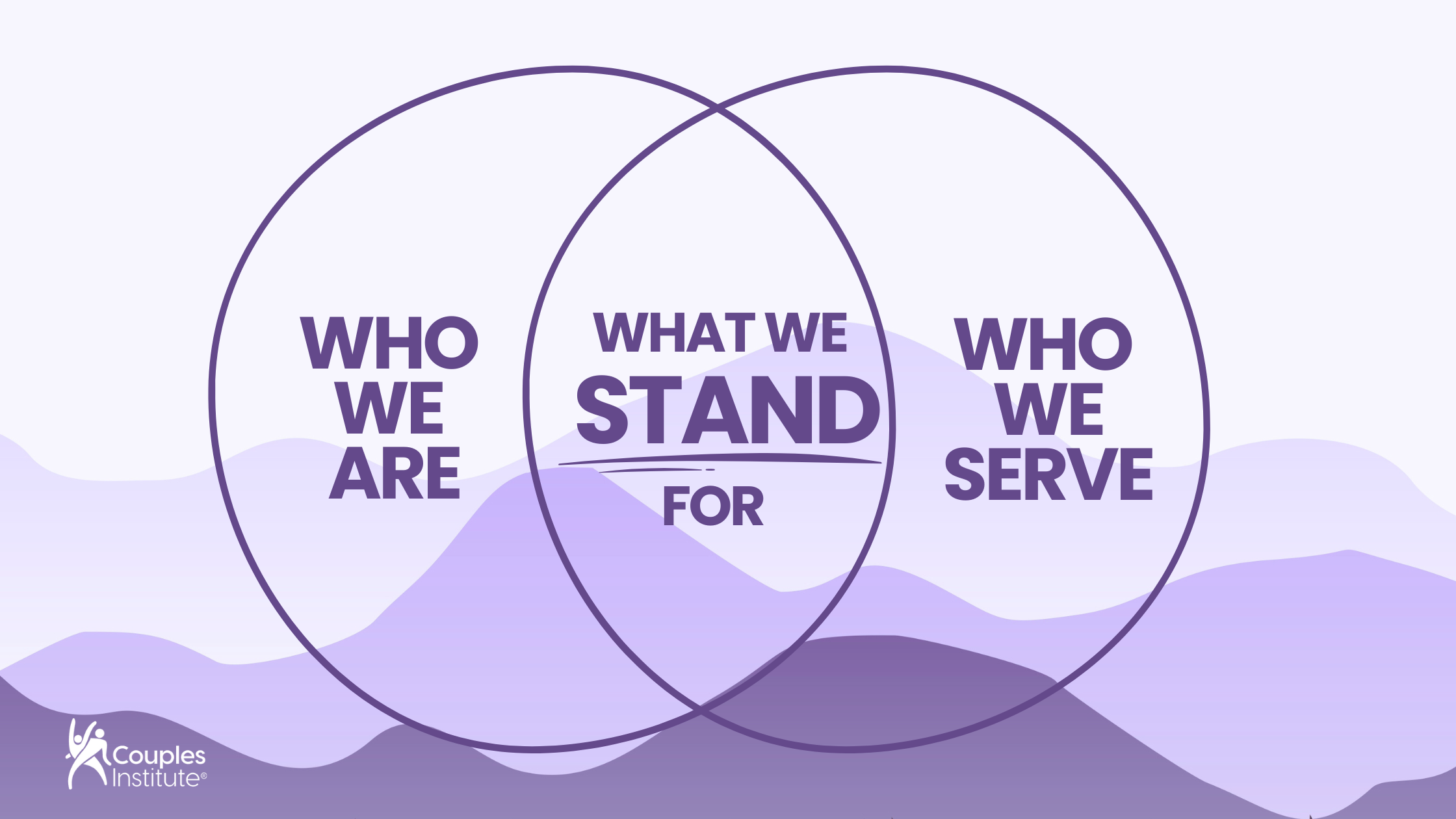
Daily Double Practice Guide
[Editor’s Note: This exercise for couples helps partners communicate to each other twice a day that they love, respect, value, or appreciate what they do

Losing control of a given couples therapy session happens sooner and faster than you think.
How soon?
Often it is in the first few minutes of a session.
Here’s what I mean.
It has to do with how you start a session.
Here are some very common openings for couples sessions:
These seemingly innocuous questions are gold plated invitations for highly distressed couples to start criticizing and attacking. These questions make it too easy to focus on what is wrong.
Each partner tells you about their partner’s deficiencies. They want you to recognize where the other was insensitive and uncaring. Tension quickly mounts and soon you have lost control of the session!
Ironically you are the culprit. Those innocent questions are OK for individual clients but are especially dangerous with very angry partners, passive aggressive partners or with partners who have a significant trauma history.
So what is the alternative?
Instead of floundering, take control immediately.
Here are a couple of my favorite ways to start:
I once returned from a long trip to Kenya. For many couples it had been three weeks since our last meeting.
Historically I would have asked them to catch me up on how things had been since our last session. I learned over time that highly distressed partners may mention one or two good things, but then they quickly launch into recounting serious fights or disappointments. I would feel a strong pull to react to their agenda. And the blaming would begin.
This old way of inquiring unfortunately encouraged a self-centered perspective about their own hurts. It also minimized the impact they had on each other and perpetuated a lower level of development.
Now I start with a better question, especially when I have any concerns about hostility dominating the session. “Charlie, how would you describe Sue’s experience since our last meeting? How did you contribute to her highs and lows and what do you think she will say about your contributions to the current state of your relationship?”
I will ask each person this question. But, just as important, I will avoid immediately investigating any fight they had and continue getting a better description of how they viewed each others' experience. This allows me to take time to decide the most relevant path for us to pursue rather than becoming reactive.
Applying the concept of differentiation enabled me to question what I was asking and why I was getting the results I was getting. As I have developed a deeper understanding of differentiation, I have learned how to ask better and better questions that keep me in control of sessions.
Indirectly my new questions push for more differentiation by inquiring how aware each partner is of the emotional state of the other and how aware they are of their own role in what goes wrong.
I want both partners to get out of their own self-interested, self-protective bubble and become more descriptively aware of their partner’s worldview.
And I want sessions to be more productive with less effort from me.
Please comment below. What is a favorite question you use to start sessions with angry partners? Also let me know if changing how you start sessions has made a difference in your work.
In this blog, my focus has been on starting therapy in a way that increases the capacity for other-differentiation. An increased focus on other-differentiation will make your couples therapy work easier and more rewarding. You can gain a much deeper understanding of differentiation in my online training program. For more information or to get on the waiting list click here.
If you missed last week's Losing Control: When Couples Sessions Spin Out of Control, click here to read it now.
"*" indicates required fields
 We respect your privacy.
We respect your privacy.
"*" indicates required fields
 We respect your privacy.
We respect your privacy.
[Editor’s Note: This exercise for couples helps partners communicate to each other twice a day that they love, respect, value, or appreciate what they do

[Editor’s note: this love letter went to our email list on Valentine’s Day and it seemed good enough to give it a permanent home on

As we look into the New Year, I want to share with you very clearly what Couples Institute stands for, now and always. Most of
"*" indicates required fields
Perfecto. Makes perfect sense. Seems like one of those obvious innovations in life where we think to ourselves “Why didn’t I think of that?” But that’s why we have you, Ellyn.
I like the plan of opening the session with asking what they took from the previous session that helped them make a difference that week. Also to note the differences in partner. I have fallen into the trap of asking how things have been since our last session and the response was in hearing all the negatives. So helpful advice Ellyn
Helpful. Sometimes I ask ‘what have you been aware of in yourself or your spouse since our last meeting?’ Helps increase their awareness of their behavior and attitudes as well as comment to spouse something they noticed about her/his behavior.
Hey Ellyn Great article! I love your ideas about how to start a session and I have some similar techniques. for example I might ask a person :So what do you think you have changed in yourself this past week. How do you feel about what you have done??–this is ore for self differentiation and helping people look at becoming the partner they want to be. So many couple need help with defining themselves and then the other awareness is equally important–Great training! Love it. Patrice Wolters psychologist
Thank you for your generous contributions to couples and to our practices! One question I ask that yields productive conversation is “What insight about yourself or information that you gleaned from you partner has been most helpful so far and how are you using it?”
I found this to be true, by starting with open spaces, couples would fill the space with what they knew–and that was often stress, anxiety, fear, anger and hurt. I would usually start with a brief recap of their strengths, the progress they made, and to recognize on some level that change was happening between them, and with the three of us. Being less directive promoted negative interactions, guided tours worked much better. Promoting emotional awareness of others is one of the most challenging aspect of this work.
wow, that makes a lot of sense, you pinpointed what always went wrong with my couple sessions and the reason I finally gave up on couples counselling. It was a great article, thank you!
I tried these questions with my first couple clients of the day. Wow, what a difference!
Thanks, Ellyn!
How would you apply this technique in healthcare motivational interviewing where you are meeting with a patient regarding their health? In MI, we are taught to ask the patient what they want to focus on, what their goals are on that day. Sounds like we could tweak the MI techniques the same way based on if they had a previous appointment. Then the question “Tell me one thing you remembered from last week’s session that influenced you to do something differently this week” would be pertinent. But if this is perhaps your only appointment …?
I continue to learn from you Ellyn, even after all these years. For some reason I have not had much luck asking highly distressed couples what they took from the previous session that helped them interact in a more helpful way. I generally go with a discussion about intention and do not allow them to slide off into criticism but hold them to looking for what they are hoping for. Then move to what they will have to change to get that. I love the “Charlie” question above because it not only requires reflexivity and differentiation, it promotes attachment at the same time.
what is the “Charlie” question above you are referring to?
I had the same question! In one of Ellyn’s questions above it starts: “Charlie, how would you describe Sue’s experience since our last meeting? How did you contribute to her highs and lows and what do you think she will say about your contributions to the current state of your relationship?”
Thank you for the suggestions on how to start sessions more effectively. I just finished a couples session and while I started it using “How have things been over the last week?” question I was also aware, even before reading this blog, of where this question typically leads. I look forward to more suggestions about how to keep the focus on individual change and differentiation. I typically use the I/I process to move things that way, as I did today, and it is almost always productive.
I often have started by asking what improved or changed for the better since our last session. However, I like you way even better. To get clients to look more at how their partner will view their behavior, takes it to another level. I appreciate your wisdom and billiance!
Thank you all for your comments! In very high distress relationships, so many partners magnify the impact their partners have on them and minimize their own role in creating difficulty. In these fighting couples, I particularly like knowing if they remember anything from last week’s session and if they allowed it to influence them to do something different.
I begin a session with an angry couple by acknowledging the tension that is in the room. I tell them I’m glad they’re showing me what happens when they are frustrated and angry because this is the best time to learn more effective ways of interacting with each other.
I guide them through a breathing practice and give them time to connect with their inner wisdom. Opening up this space helps each partner to remember the bigger picture, to decide how they want to be during the session, and to stretch into more effective ways of talking, listening and understanding each other.
This is great! I start sessions with “would you please each share with your partner something they have done that feels like progress, and what about it was meaningful to me?” but this is not my brilliance, it is yours, because I learned that from you, Ellyn! And I have definitely noticed an improvement since I started using that. After a few sessions, they know I’ll be asking, and they are more alert to positive things because it is awkward when they don’t have anything to say. And with practice, I can coach them to go a little deeper with it, like by indicating how they feel when their partner is able to do that thing. Tomorrow I’m going to go from there to asking them to talk about what they think their partner’s experience has been and how they have contributed to it, because when I have used this general concept with very distressed couples it has created breakthroughs. Your language is absolutely perfect, and I’m writing it down!
Great brain expander. Made me think about differentiation in a new way. The difference between old way of thinking and the new way of thinking. A new set point for each individual to be investigated.
I often talk about “intent” with highly distressed couples – “What was your partner’s intent when he/she said that to you?” Asking the circular question about how she/he would see your contribution to the relationship helps, as you said Ellyn, the other-differentiation process, and leads nicely into the intent conversation I regularly use. In the last couple of years I have changed my introduction to asking more about achievements than low points. I find this works well with individuals – especially teenagers who are in counselling because they have been “in trouble” with parents or teachers. “Tell me some good stuff that has happened to you this week” works well.
I like this new line of questioning, seems to automatically have a more softening and deeply insightful move on the partners to not attack, be defensive and to be critical, instead self awareness and understanding
Thanks Ellyn! Great thoughts. I especially like the one about asking each partner to describe the other’s experience of the week, which I often do mid-session when partners are very far apart in their experiences and unable to see each other’s POV. But I love the idea of starting the session with that, and then the add-on about what they did to contribute to ups & downs.
I am really grateful for the language you are sharing in these blogs. Hearing the concepts help and hearing the actual language helps me integrate the learning next session. These are gems.
I know when I use similar ones thing go better and the whole session feels more productive. One I use that I learned from Ellyn (hope i am quote correctly) is “which one of you is ready to stretch themselves tonight in a new way?”. I then have their individual developmental goal in mind and the next steps towards differentiation. I do also like to ask, “What is something that went well since I have seen you last?”. I wonder if that is too vague?
One thing I find challenging with couples is that I can’t always get them to come in once weekly. This is usually due to having young children and two working spouses and trying to find the time and childcare. It also happens with active duty military people who get sent out of town on exercises frequently. So when they come 2-3 weeks may have passed or even a month. At that point it harder to ask questions like these ones. Should I give my couples an ultimatum to come weekly? Or is there a way to ask questions to get the process productively rolling when there is a longer time between sessions?
Ellyn- I’ve been through Level 1 and Level 2 now for at least the third time(?) but it wasn’t until I read this that something clicked for me: That is, how broadly pushing for self/other differentiation can be applied. I mean I’ve heard you talk about doing so before but, the concept had not generalized until I read this piece. Thank you. This has opened up new areas of application(s) for me.
I almost always ask what’s been happening between you that feels better? And I often ask them to put a complaint into xyz mode – like when x happens I feel y – can you please do z ? I encourage differentiation by not allowing one to describe the feelings thoughts or intentions of the other . I always say let your spouse speak for herself or himself. But it’s ok to say I imagine or am afraid s/he is thinking or wanting or feeling this or that and then asking the partner whether this is so. So Ellyn I like the idea of pulling each one out of their self centeredness but would tweak the wording to preclude speaking for the other ones inner world without checking with them
Maybe I know what you mean, Shana. It can be risky to ask what one client thinks their partner might be feeling or thinking.
Your comment reminded me of one client where I mistakenly over-reached by asking him “Why do you think she would behave that way?” It seems I should have asked about her experience of him, not his idea of the reason for her behavior (which would be based on his speculation about her thoughts or feelings, based on her perception — many steps down the line from his apparent control or responsibility).
He responded by attributing it her scheming and maliciousness, which I hadn’t seen at all! It was a shocking revelation — yet perhaps even more important because it unearthed his radical perspective. (At that point I tried to recover with, if that was really true, he should not be with her. But could there be another explanation for her apparent coldness, like she might be protecting herself?)
I still believe that the opportunity to expand his theory of mind and empathy and other-differentiation is worth a golden invitation to consider the partner’s perspective. As you point out, the crucial follow-up is to say “Do you want to ask her if you are right?”
I note Ellyn’s question uses the wording about Sue’s “experience”, not her thoughts or feelings (which would be a result of that). So maybe that would tend to make Charlie report more about objective conditions, meaning how Sue saw Charlie “contribute” and behave? Or are we hoping for too much from Charlie to make that distinction?
Lately, rather than use the word “experience” (which has a common HR-like definition of “involvement in events providing knowledge or skill”), I have been using a more basic phrase about “what it is like”. If I wanted to be pointed, I might say, “What do you think it was like to be married to you for the past week?”
Hi Ellen
Your blog was a wonderful and timely reminder for me.
I have been working with a mother and daughter to repair their relationship and on a couple of occasions we have slipped into limbic looping and very entrenched disagreement.
I used your ideas to plan a way to help them understand their respective limbic processes whilst staying connected to their neo-cortical functioning. The session worked really well from my perspective and, I hope, helped them make significant progress.
Thank you for sharing your expertise.
This is excellent education; I realize how I have been contributing to couples doing precisely what you say- just staying stuck in their misery when I ask the general “how are you?” type of questions.
This is super helpful w hostile couples/partners and really most couples! I am afraid to use the question about the partner’s experience w one client/partner who is an extreme people pleaser always blaming himself. I can imagine him going on an on about how she must experience him as irresponsible and how hard it must be for her… Any suggestions for that type of partner? Thank u!!
Wow, there is a lot going on there Hyelee, such as a shame component to be unpacked? Was it infidelity? Could it be a cultural “folkway”, or dependent PD, or even vulnerable narcissism? Aside from a focus on the individual, have you got the basic dance or pattern that keeps them together, but unhappy? I can’t speak for Ellyn or the Institute, but maybe the Developmental Model would suggest self-differentiation work, and addressing conflict-avoidance. A case consultation would probably be in order.
Excellent opening questions. I love it: “I want both partners to get out of their own self-interested, self-protective bubble and become more descriptively aware of their partner’s worldview.”
The pulls to negativity, failures, complaints about the other, and content are so strong!
Thanks for the great reminders to focus on positivity, successes, personal goals/accountability, and process.
I agree with Paul — these refreshers are so valuable! I was challenged to write or rewrite some prompts for myself. Not as brilliant as the “Charlie” question, but here’s what I got:
Yes, I have asked, “What would you like to focus on today?” And the session did spin out of control. I didn’t know what to do, but tried anyway, and ended up with a bad feeling. I have not worked with couples much, so I really appreciate the honesty of this article telling me that this happens and it is something I can change about myself. I find comfort in the comment “ Those innocent questions are OK for individual clients but are especially dangerous with very angry partners, passive aggressive partners or with partners who have a significant trauma history.” I work well with individuals; if I decide to go forward with couples, I can benefit from getting a different perspective and initial question. Thank you, Ellyn, for unpacking this concept of how to start the conversation for success.
Really good reminder…I realize how I can become symbiotic (and protected) when I feel intimidated by one or the other’s distress and contribute to the escalation. Thank you so much, Ellyn.
Thanks for these gems
Excellent! I often start my work with a couple with other oriented Qs but then fall into the trap in later sessions! Thank you Ellyn
I love this opening and makes total sense and is very creative and relational. Thank you so much, Ellyn!
I have become such a fan of your work and the concept of differentiation, while still focused on your relatiuonship…thank you Ellyn. I am trying to keep them focused on what they have contributed to making the relationship better week by week; sometimes they say “nothing I can particularly recall” and I follow up, with “Nothing that is not aggravating the situation is a something! If you have actively avoided some of your previous unhelpful habits that is a great contribution.”
I often say, “let’s start with what is going well. Can each of you say one thing you took away from last sessions and are practicing to make a positive difference and one thing you noticed your partner did?”
Really useful and positive way to open a session and avoid inviting the litany of complaints and things that they have developed a pattern in their interactions. Thank you Ellyn
Interesting – thanks Ellen for the reminders about asking differentiation focused opening questions.
Really like the the movement from self-referencing to build the capacity to think about the other and another and not extension of self.
I used the “Charlie/Sue” questions for the first time earlier today and it went exceptionally well. So, thank you Ellyn! I often find these tips so incredibly helpful.
Love the new questions. I’m using them immediately
Excellent ideas. I will implement them in today’s couple sessions.
Wonderful article Ellyn. It was nice seeing you in Kenya! In the past I have used appreciation at the beginning of the sessions, and this has helped the couple put down the loaded guns that were corked and ready to shoot. I have seen that it enables the couple to think more about the other person rather than focus on themselves and start the blame game.
In general, this sounds like a good approach, but I am Concerned, whether this would protect or encourage a manipulative or destructive, threatening or violent partner. This could be seen as “there are good people on both sides approach”, which only works if there are really good people on both sides, with good intentions for the long run.
Brilliant and just what is needed, Ellyn. As always!
I ask each partner -give me an example as to when you were the partner you espire to be and perhaps got closer to your own goal for your own development within this relationship since last I saw them.?